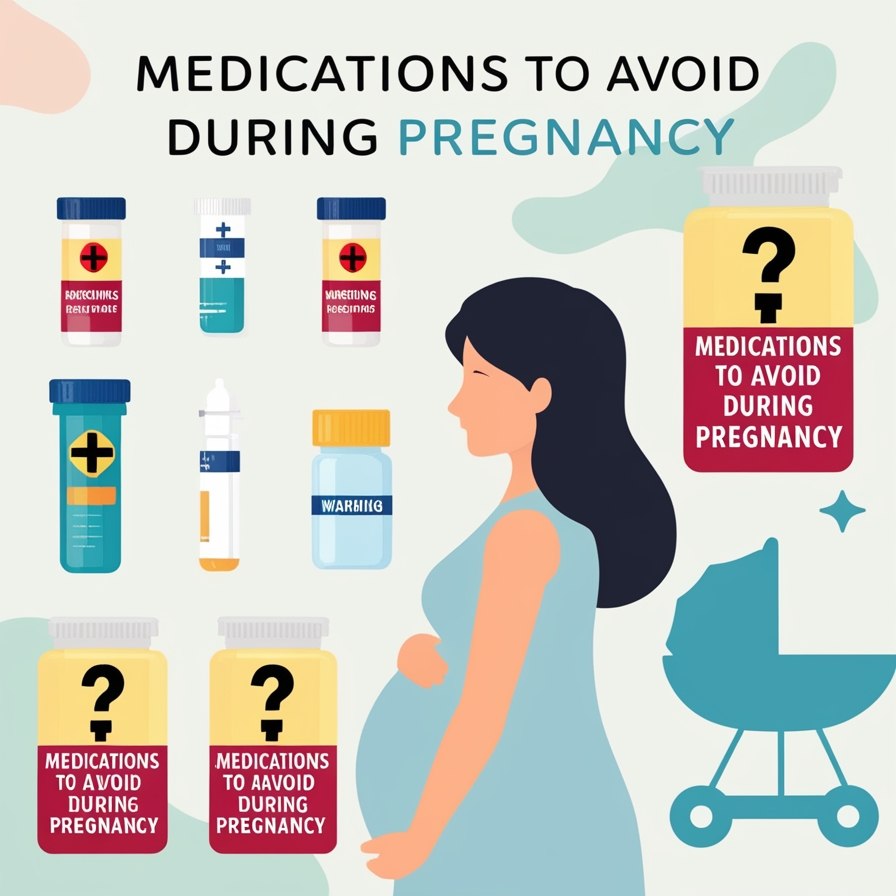Pregnancy is a crucial time for both the health of the mother and the developing baby, while many medications are safe for use during pregnancy, some can pose significant risks to both the mother and the fetus, It’s important for pregnant women to be aware of which medications should be avoided and to always consult with their healthcare provider before taking any prescription, over the counter (OTC) or herbal medications.
Here’s a comprehensive list of medications that should be avoided during pregnancy.
1. Nonsteroidal Anti-Inflammatory Drugs (NSAIDs)
- Examples. Ibuprofen (Advil, Motrin), Naproxen (Aleve), Diclofenac (Voltaren)
- Why to Avoid.
NSAIDs can cause complications such as miscarriage, premature closure of the fetal ductus arteriosus (a blood vessel that’s important during fetal circulation) and low amniotic fluid. - Safer Alternatives.
Acetaminophen (Tylenol) is generally considered safe during pregnancy, but it’s always best to consult a healthcare provider for proper dosage and usage.
2. Certain Antibiotics
- Examples. Tetracycline, Doxycycline, Minocycline, Streptomycin.
- Why to Avoid.
These antibiotics can cause harm to the baby, including tooth discoloration, impaired bone development, and potential hearing loss. - Safer Alternatives.
Penicillin, Amoxicillin, and Erythromycin are commonly prescribed antibiotics that are considered safe for use during pregnancy.
3. Accutane (Isotretinoin)
- Why to Avoid.
Isotretinoin, commonly used to treat severe acne, is highly teratogenic (can cause birth defects) It is associated with a high risk of miscarriage, as well as severe physical and developmental birth defects. - Safer Alternatives.
Topical treatments or other acne medications approved by your doctor may be safer alternatives during pregnancy.
4. ACE Inhibitors and ARBs (Angiotensin Converting Enzyme Inhibitors and Angiotensin Receptor Blockers)
- Examples. Enalapril, Lisinopril, Losartan, Valsartan.
- Why to Avoid.
These medications, used to treat high blood pressure, can cause kidney damage, low blood pressure, and even death in the fetus, they can also lead to developmental delays and birth defects. - Safer Alternatives.
Methyldopa or labetalol are safer options for managing high blood pressure during pregnancy.
5. Benzodiazepines
- Examples. Diazepam (Valium), Lorazepam (Ativan), Alprazolam (Xanax)
- Why to Avoid.
Benzodiazepines, commonly prescribed for anxiety or insomnia, can cause sedation, low blood pressure, and withdrawal symptoms in the baby, long-term use may increase the risk of birth defects and developmental delays. - Safer Alternatives.
Non-medication treatments for anxiety, such as therapy, mindfulness, and relaxation techniques, are often recommended during pregnancy.
6. Warfarin (Coumadin)
- Why to Avoid.
Warfarin, a blood thinner, can cause severe birth defects, bleeding, and even death, it’s not recommended during pregnancy, particularly in the first trimester. - Safer Alternatives.
Heparin or low molecular weight heparin (LMWH) are typically prescribed for blood clot prevention during pregnancy, as they don’t cross the placenta and are safer for both the mother and baby.
7. Thalidomide
- Why to Avoid.
Thalidomide, which was historically used to treat nausea, is known to cause severe birth defects, including limb deformities, and should never be used during pregnancy. - Safer Alternatives.
Alternative treatments for nausea, such as vitamin B6 or prescribed anti-nausea medications like Ondansetron, are safer options for pregnant women - Miscarriage, Understanding the Causes and How to Prevent It
(Read More Here)
8. Hormonal Medications
- Examples. Estrogen, Progestin, Birth Control Pills.
- Why to Avoid.
Hormonal medications can disrupt pregnancy and lead to complications, such as an increased risk of blood clots, miscarriage, and developmental issues for the baby. - Safer Alternatives.
If you are pregnant and experiencing symptoms related to hormones (e.g, excessive bleeding) consult with your healthcare provider to determine the safest treatment options.
9. Certain Herbal Supplements
- Examples. Black Cohosh, Dong Quai, Evening Primrose Oil, St. John’s Wort.
- Why to Avoid.
While herbal supplements are natural, they can be just as potent as pharmaceutical medications and can pose risks, such as preterm labor, miscarriage, or toxicity to the fetus. - Safer Alternatives.
Always check with your doctor before taking any herbal supplements, as some may be safe while others can interfere with pregnancy.
10. Retinoids (Vitamin A Derivatives)
- Examples. Retin-A, Tretinoin, Retinol.
- Why to Avoid.
Retinoids, used for acne and skincare, can cause severe birth defects, including brain and heart abnormalities, in the developing baby. - Safer Alternatives.
Non-retinoid topical treatments or gentle skincare products like moisturizers are recommended during pregnancy.
Important Notes
- Always Consult Your Healthcare Provider. This list is not exhaustive, many medications, including over-the-counter and prescribed drugs, require evaluation by a healthcare professional to ensure their safety during pregnancy.
- Take Only Essential Medications. Avoid any medications that aren’t absolutely necessary, always follow your doctor’s recommendations when it comes to both over the counter and prescription medications.
Final Thoughts
Taking care of your health during pregnancy is essential for both your well-being and that of your baby, avoiding harmful medications and discussing alternatives with your healthcare provider will help ensure a healthy and safe pregnancy, by staying informed and proactive, you can reduce risks and give your baby the best start in life.

